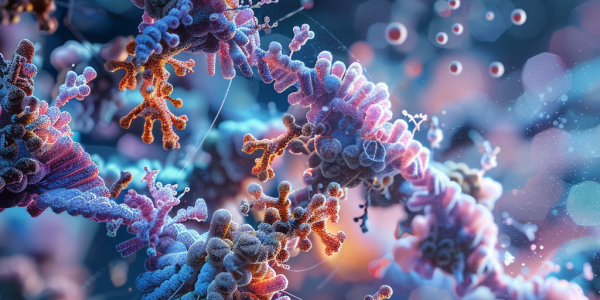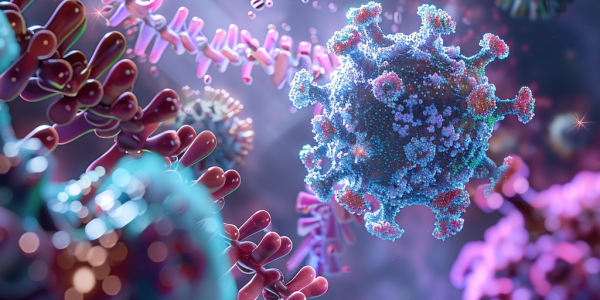AlphaFold 3: Revolutionizing Molecular Understanding with Advanced AI Model
AlphaFold 3, a cutting-edge AI model developed by Google DeepMind and Isomorphic Labs, revolutionizes the understanding of life’s molecules by accurately predicting the structure and interactions of proteins, DNA, RNA, and ligands. With a significant improvement in predicting protein interactions and practical applications in drug design, the model offers unprecedented insights into the biological world and pharmaceutical research. Collaborations with pharmaceutical companies are leveraging AlphaFold 3 to address real-world challenges in drug development, showcasing its potential to enhance patient care through innovative treatments.
Exploring the Impact of Viruses on Microbial Ecosystems
Researchers are still working to fully understand the impact viruses have on microbial ecosystems due to their diversity and rapid evolution. A new approach to annotating viral sequences aims to bridge the gap in our understanding, revolutionizing the analysis of viral genetic data and enhancing global studies of viruses in diverse environments.
Potential Breakthrough in Parkinson’s Disease Treatment
Recent research reveals the potential of pharmacological inhibition of α-synuclein aggregation within liquid condensates as a breakthrough in Parkinson’s disease treatment. The study explores the role of α-synuclein aggregation in Lewy bodies and the impact of small molecules, such as claramine, in inhibiting this process. This discovery offers hope for innovative treatments that could combat protein aggregation in neurodegenerative disorders and potentially reverse the progression of Parkinson’s disease.
Protein Marker Identified for Repairing Damaged Blood Vessels
Researchers at Indiana University School of Medicine have identified a protein marker that can help pinpoint cells capable of repopulating in individuals with damaged blood vessels. This groundbreaking discovery has the potential to revolutionize therapies for endothelial dysfunction and coronary artery disease. The study, led by Chang-Hyun Gil, Ph.D., MS, marks a significant milestone in the field of cardiology, offering hope for new cell therapies in repairing damaged blood vessels.
New Discovery Reveals Mechanism in Brown Fat That Could Help Combat Obesity
Researchers have discovered a new mechanism in brown fat that acts as an ‘off switch’ shortly after activation, posing limitations on using brown fat as a treatment for obesity. By blocking the protein responsible for deactivation, a new strategy could be developed to activate brown fat safely, potentially addressing obesity and related health issues.
Top 10 Plant-Based Protein Sources
Discover the top 10 plant-based protein sources that are not only rich in essential amino acids for muscle growth and overall health but also have a lower saturated fat content and reduced environmental impact. From soy chunks to chickpeas, these nutrient-dense options provide a variety of protein-rich choices for plant-based eaters.
Study Reveals How SARS-CoV-2 Disrupts Protein Production in Infected Cells
Learn how a recent study from the University of Toronto’s Temerty Faculty of Medicine reveals how SARS-CoV-2 disrupts protein production in infected cells, shedding light on the virus’s manipulation of cellular machinery. The research, led by post-doctoral researcher Talya Yerlici and published in Cell Reports, uncovers how the SARS-CoV-2 protein Nsp1 hinders protein synthesis and impairs the cell’s defense mechanisms, creating challenges for mounting an effective immune response. Explore the potential for targeted therapies to counteract Nsp1’s effects and enhance treatment strategies for COVID-19.
RevolKa Ltd. Partners with La Jolla Institute for Immunology to Develop Next-Generation Vaccines
RevolKa Ltd. partners with La Jolla Institute for Immunology to develop next-generation vaccines using innovative protein engineering technology aiProtein. This collaboration aims to address unmet medical needs in infectious diseases, marking a significant step towards advancing vaccine research and development.
Discovery of Antibacterial Umbrella Particles in Streptomyces Bacteria
Recent research in Nature reveals how Streptomyces bacteria produce unique umbrella particles to inhibit the growth of competing bacterial species. These antibacterial complexes contain polymorphic toxin proteins and lectin components, targeting specific Streptomyces species. Unlike broad-acting antibiotics, umbrella particles mediate competition among related species, offering insights into bacterial dynamics in soil ecosystems and potential for novel antimicrobial strategies.
The Controversy Surrounding Protein Bars
Protein bars have surged in popularity as a quick and convenient source of protein, but their health claims have come under scrutiny. Despite their high-protein label, many bars contain unhealthy fats and high calories, classifying them as ultra-processed foods. Research on the health benefits of protein bars is limited, and some ingredients may negatively impact gut health. Studies on the effects of protein bars have yielded mixed results, indicating the need for further investigation. While they offer convenience, the overall impact on health and well-being remains a topic of ongoing research and debate.










